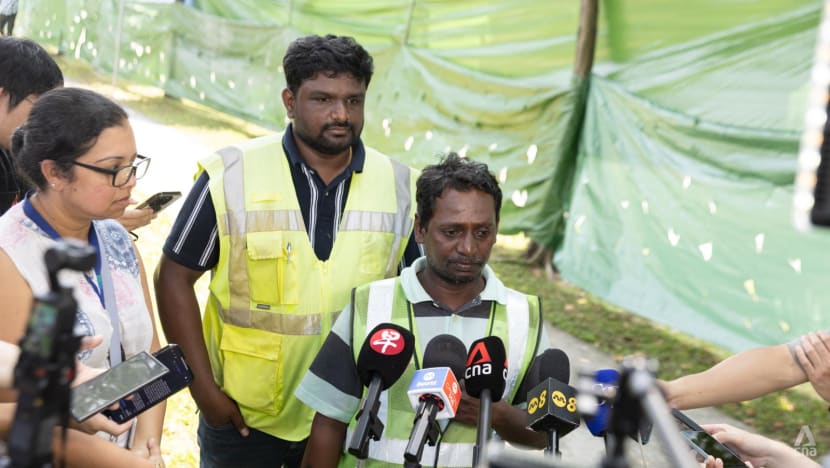Commentary: The most fitting reward for migrant workers who rescued driver from Tanjong Katong sinkhole
The migrant workers who rescued a driver from the Tanjong Katong sinkhole ought to be recognised in dignified and meaningful ways, says former Singapore Kindness Movement General-Secretary William Wan.

Foreman Pitchai Udaiyappan Subbiah speaking to reporters on Jul 27, 2025. He was at the scene when a sinkhole opened up along Tanjong Katong Road South. (Photo: CNA/Ili Mansor)

This audio is generated by an AI tool.
SINGAPORE: On Jul 26, migrant workers rescued a driver of a car that fell into the Tanjong Katong sinkhole.
The men acted spontaneously without proper equipment or training. They exhibited humanity, selflessness and courage which generated an outpouring of praise from all quarters.
This was not the first time migrant workers came to the rescue. In April, construction workers saved several children from the River Valley shophouse fire. They were also lauded online, and received the SCDF Community Lifesaver Award.
The seven workers who saved the driver were given token recognitions from the gift of appreciation coins, which elicited some negative comments, to being invited to the Istana, which was seen as nice but not quite sufficient.
Non-governmental organisation ItsRainingRaincoats raised S$72,000 (US$55,000) for the workers in two days, but some netizens asked whether a cash reward would make selfless acts a transaction. Would workers who do good now expect something in return?
HOW SHOULD ACTS OF HEROISM BE REWARDED?
The fact is, regardless of what’s done for these workers, people are going to criticise. But there is no evidence that these folks acted with any expectation. Rewards do not necessarily convert an altruistic act into a transactional one.
We can agree that valour ought to be publicly recognised in a dignified and tangible way that moves beyond just symbolism. It unequivocally demonstrates that we place a high value on the lives saved and the courage displayed.
For migrant workers, a substantial cash reward may be life-changing as it can relieve their debts and transform their family's prospects back home by funding education, healthcare or housing. The government could set up a Public Valour Fund that could be supplemented by donations raised by charities.
Besides cash prizes, there are other ways to reward heroic migrant workers that might be meaningful for their individual needs and aspirations.
For instance, their work permit could be automatically renewed for a significant period, barring work-related and social misconduct. They can also be awarded access to heavily subsidised or free skills certification courses, to enhance their employability and earning potential within Singapore.
Perhaps comprehensive insurance coverage for all physical injuries and mental health issues could be given to them as well.
Some netizens suggest that our government could even grant heroic workers permanent residence (PR) status. This could be the most profound and transformative reward, signifying Singapore’s willingness to embrace migrant workers as part of the national fabric.
Of course, it should not be automatic for all. Their heroic act is a powerful merit, assessed alongside other factors like clean work record, basic language proficiency and employer’s recommendation.
GO BEYOND CELEBRATING MIGRANT WORKERS
Singapore continues to transform itself into a world-class city. We owe a great part of this to over 1.5 million foreign workers, representing about 40 per cent of our workforce.
As we celebrate our 60th year as a nation on Aug 9 with the theme “Building Our Singapore Together”, we must acknowledge the literal contribution of blood, sweat and tears of our migrant workers.
This year’s theme also highlights the importance of multiculturalism, boldness, resilience and openness in our nation’s continued progress.
If we espouse these values, it would be patently hypocritical if we appreciate migrant workers only in emergencies, and not when they contribute to our nation every day.
Migrant workers have faced many challenges in living and working in our midst. Welfare issues from excessive recruitment fees to poor dorm conditions and getting ferried in lorries are perennial talking points. And some in Singapore still view migrant workers as second-class citizens.
In sum, how they are treated daily is the litmus test of how sincere we are in valuing them.
To be sure, there have been positive changes since COVID-19. In 2024, 46 per cent of Singapore respondents in an International Labour Organization (ILO) report said that the pandemic has made them “more supportive” of migrant workers.
Those who feel that foreign workers “have an overall positive effect on the economy” has gone up to 69 per cent from 58 per cent in 2019.
But there is much room for improvement. We need to be a nation that takes care of foreign workers who live here. Some, like foreman Pitchai Udaiyappan Subbiah, who led his team to save the driver from the sinkhole, have worked in Singapore for decades. This is as good as their home.
We are aware of the needs of the migrant worker community. We have discussed and debated them endlessly. On the eve of our 60th national birthday, it is time to go beyond celebrating migrant workers to treating them as one of us – treating them as we would like to be treated, and giving them the respect and care for building our nation.
Dr William Wan is a practising lawyer and former General-Secretary of Singapore Kindness Movement.


















